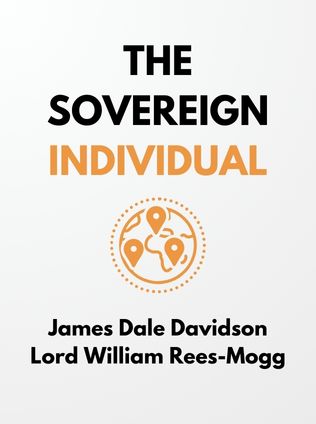
The Sovereign Individual
Mastering the Transition to the Information Age
By James Dale Davidson and Lord William Rees-Mogg
Published 01/1997
About the Author
James Dale Davidson and Lord William Rees-Mogg, the co-authors of The Sovereign Individual, bring together a wealth of knowledge and experience from their respective fields of venture capitalism, journalism, and finance. Davidson, an American investment writer and economist, has dedicated much of his career to understanding the implications of economic trends on global civilization. He is also known for co-founding the National Taxpayers Union and Agora, Inc., a publishing company that specializes in financial and investment newsletters.
Lord William Rees-Mogg, a British journalist, was the former editor of The Times and served as Vice-Chairman of the BBC. He was a member of the House of Lords and a prominent public intellectual with a keen interest in economic and political theory. Together, Davidson and Rees-Mogg combine their expertise to offer a visionary analysis of the future, predicting seismic shifts in the structure of civilization brought about by the rise of the information age.
Main Idea
The Sovereign Individual explores the profound impact that the transition from the industrial age to the information age will have on individuals, economies, and governments. The authors argue that this transition will empower individuals in unprecedented ways, leading to the eventual decline of nation-states and the rise of a new social order dominated by sovereign individuals—people who will transcend traditional government structures and operate as their own autonomous entities.
Davidson and Rees-Mogg base their predictions on the theory of megapolitics, which suggests that the dominant form of government and economic systems in any era are dictated by the prevailing technological and environmental circumstances. As we move further into the information age, the authors foresee a fragmentation of large nation-states into smaller, more efficient entities, including city-states, cyber communities, and individually sovereign estates. This will be accompanied by an increase in personal autonomy and a corresponding decrease in the power of traditional governmental structures.
Table of Contents
- Introduction to Megapolitics
- The Industrial Age and Its Decline
- The Information Age: A New Era of Wealth and Power
- The Virtual Economy
- The Decline of Nation-States
- The Rise of Sovereign Individuals
- Challenges of the Transition
- Conclusion: A New Dawn
Introduction to Megapolitics
At the heart of The Sovereign Individual is the concept of megapolitics. The authors define megapolitics as the underlying forces—primarily technological and environmental—that shape the power structures and economic systems of societies. These forces determine how wealth is created, distributed, and protected, and they drive the rise and fall of civilizations.
Davidson and Rees-Mogg argue that throughout history, societies have been organized around the technologies that were available to them. In the agricultural age, land was the primary source of wealth, and societies were structured around feudal systems. The industrial age, which began around 1500 AD, shifted the focus to capital and large-scale production, giving rise to nation-states and industrial capitalism. Now, as we transition into the information age, the authors predict a new era where knowledge and information are the primary sources of wealth. This shift, they argue, will fundamentally alter the structure of society and the role of governments.
Sign up for FREE and get access to 1,400+ books summaries.
You May Also Like
Rich Dad Poor Dad
What the Rich Teach Their Kids About Money - That the Poor and Middle Class Do Not!
By Robert T. KiyosakiFreakonomics
A Rogue Economist Explores the Hidden Side of Everything
By Steven D. Levitt and Stephen J. DubnerI Am Malala
The Story of the Girl Who Stood Up for Education and Was Shot by the Taliban
By Malala YousafzaiFactfulness
Ten Reasons We're Wrong About the World – and Why Things Are Better Than You Think
By Hans Rosling



















